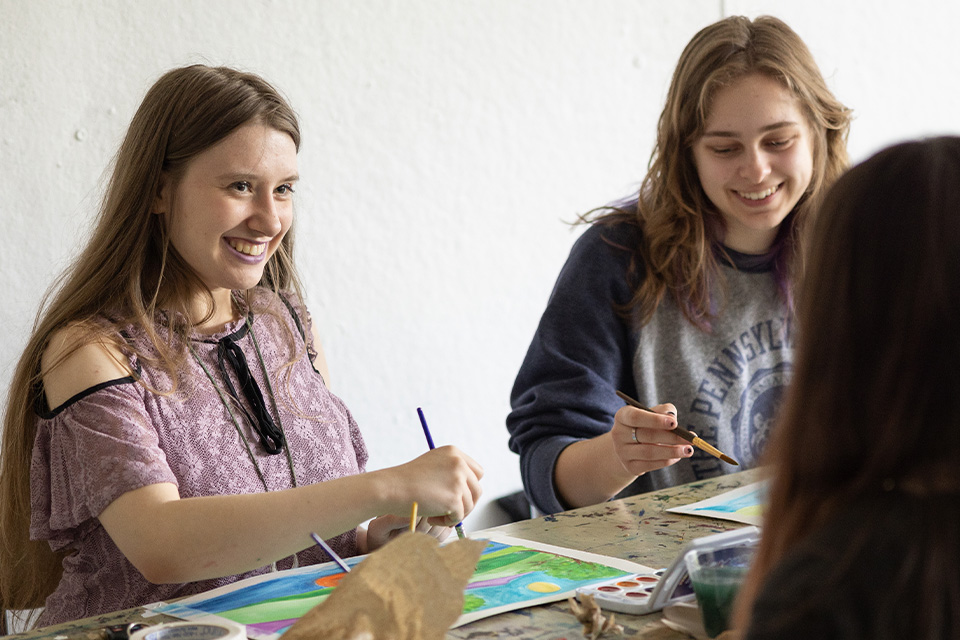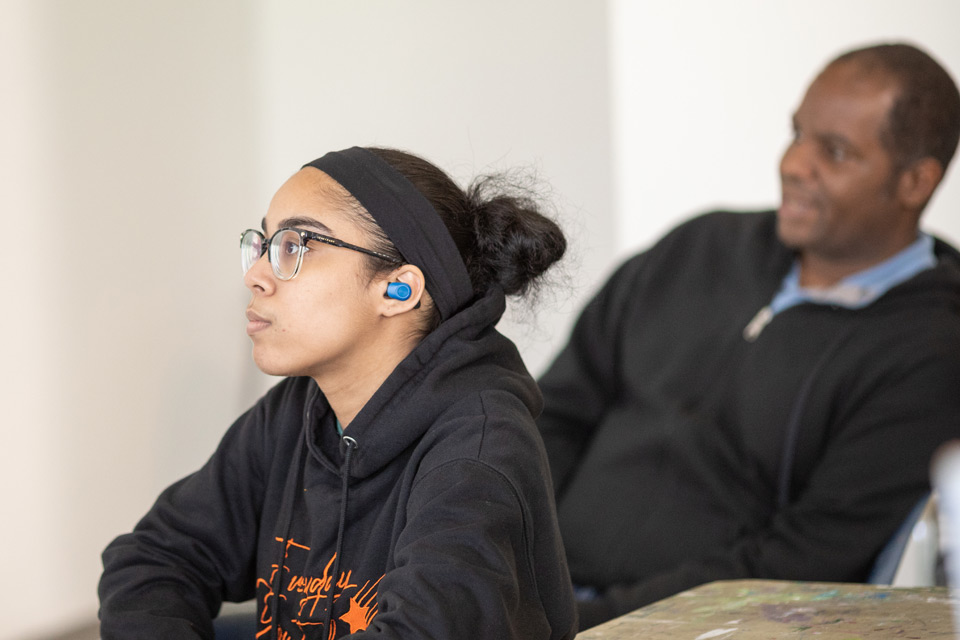Why This Program
Influence children’s learning and development with an Early Childhood Education Associate’s Degree (A.A.S.), Certificate, or Specialized Diploma (S.D.) at Northampton Community College. Hands-on learning opportunities and state-of-the-art programs set NCC apart. Here, you’ll practice in early childhood classrooms and care settings, the Reibman Hall Children’s Center, and Hannig Family Children’s Center. You’ll observe classrooms and get teaching practice alongside your coursework.
With these diverse learning experiences, you’ll develop a curriculum that combines emergent strategies, education standards and individualized approaches that meet the unique needs of each child. Whether you complete your early childhood education degree online or on-campus, you’ll gain skills through an internship placement and establish knowledge in diverse aspects of early childhood education.
The A.A.S. Early Childhood Education: Infant to Grade Four at Northampton Community College is accredited by the Commission on the Accreditation of Early Childhood Higher Education Programs of the National Association for the Education of Young Children. The current accreditation term runs from 7/1/2022 through 7/31/2029.
NAEYC Candidate Performance Data (PDF)
NAEYC Reporting Program and Student Learning Outcomes (PDF)
Education Program Requirements
What You'll Learn
With an Early Childhood Education degree, certificate or diploma from NCC, you’ll prepare to embark on a rewarding classroom career or to transfer to a four-year institution to become a certified teacher. From our Associate in Applied Sciences in Early Childhood Education to our Early Childhood Apprenticeship Specialized Diploma, you’ll gain hands-on experience and leading-edge expertise at an affordable cost.
You’ll interact directly with students and establish a deep understanding of child development, inclusionary classroom practices, and arts-inspired learning. Prepare to work as a preschool teacher or classroom assistant for infants through 4th grade, or easily transfer to a four-year institution to earn further teaching credentials.
NCC’s Early Childhood Education programs are offered fully online or at our Bethlehem or Pocono campuses. Explore our programs listed below.
Program Details
Semesters: 4
Credits: 62
College Catalog: View Curriculum
Program Map: Download PDF
Locations: Bethlehem | Fully OnlineProgram Overview:
Promote child development through evidence-based learning approaches, such as documenting and assessing support needs, building meaningful curriculums, and forming family and community relationships that support each child’s success. With an A.A.S. early childhood education degree, you can transfer to a four-year institution or start working as a lead teacher in child care centers, Head Start programs and nursery schools, or as an assistant teacher in pre-Kindergarten classrooms.
Semesters: 3
Credits: 36
College Catalog: View Curriculum
Program Map: Download PDF
Locations: Bethlehem | Fully OnlineProgram Overview:
Support children and families as an Assistant Teacher or Assistant Group Supervisor. You’ll establish a meaningful foundation in teaching skills and strategies, child development, observation and assessment, advocacy and curriculum development. You can apply your certificate toward the A.A.S. degree alongside general education requirements to advance your career opportunities or transfer to a four-year degree program.
Semesters: 2
Credits: 9
College Catalog: View Curriculum
Program Map: Download PDF
Locations: Bethlehem | Fully OnlineProgram Overview:
Enter the early childhood profession with a CDA focused on Infant/Toddler, Pre-K or Family Child Care education. Upon completion, you’ll be eligible to apply to the Council for Professional Recognition to receive a CDA assessment. You can also apply the 9 credits from this program toward an Early Childhood Education certificate or associate’s degree program.
Semesters: 2
Credits: 9
College Catalog: View Curriculum
Program Map: Download PDF
Locations: Bethlehem | Fully OnlineProgram Overview:
Teach in school-age child care centers and before/after-school programs with a School-Age Child Care Specialized Diploma, which prepares you for the Pennsylvania School-Age Professional Credential. In this program, you’ll learn about students’ social-emotional development, managing school-age programs, interacting with families and communities, and the professional Code of Ethics and Standards for before- and after-school programs. You can also apply these credits toward an associate’s degree in Early Childhood Education.
Semesters: 2
Credits: 9
College Catalog: View Curriculum
Program Map: Download PDF
Locations: Bethlehem | Fully OnlineProgram Overview:
Advance your existing expertise or train to become a director or owner of an early childcare center or program. You’ll examine strategies and best practices for leadership, business management, organization, and administration in early childhood settings. This program meets the Pennsylvania Director’s Credential requirement. You’ll need 15 credits in Early Childhood/Child Development coursework or department approval to enroll.
Semesters: 1
Credits: Not Applicable
College Catalog: View Curriculum
Program Map: Download PDF
Locations: Bethlehem | Fully OnlineProgram Overview:
Health advocates are early childhood practitioners (directors, lead teacher, family child care providers) who see to it that their program integrates best practices in health, safety and nutrition, even though they may not perform those practices directly themselves.
Program Standard 1: Child Development and Learning
Students use evidence-based knowledge of child development and learning to understand that each child’s learning and development is unique based on cultural, linguistic, and ability diversity as well as other interacting influences to create safe, healthy respectful, and inclusive learning environments that provide responsive, developmentally appropriate arts-integrated learning opportunities.
1a. Understand each child’s characteristics and needs for development and learning in all domains.
1b. Understand multiple interacting influences including cultural, linguistic and ability diversity that results in the uniqueness of each child’s development and learning.
1c. Apply evidence-based knowledge of development and learning to create safe, healthy, respectful, and supportive learning environments that are arts integrated and support the full participation of each child.
Program Standard 2: Families and Communities
Students use evidence-based knowledge to understand complex and diverse characteristics of families and communities using multiple perspectives to support each child’s development and learning through collaborative relationships.
2a. Understand how diverse and complex characteristics including cultural, linguistic and ability diversity in families and communities affect each child’s development and learning.
2b. Understand strategies educators can use to build respectful, reciprocal relationships including other professionals to support each child’s development and learning.
2c. Apply evidence-based knowledge of families, communities, and other professionals to support each child’s development and learning.
Program Standard 3: Observing, Documenting, and Assessing to Support Young Children and Families
Students use evidence-based knowledge about systematic observation and the goals, benefits, and appropriate uses of assessment in partnership with families and other professionals to understand and make decisions about environments, curriculum, and interactions to support each child’s development and learning.
3a. Understand the goals, benefits, and uses of assessment.
3b. Understand ethical methods of observation, documentation, and assessment.
3c. Understand how to partner with families and professionals in each child’s assessment process.
3d. Apply and analyze evidence-based knowledge of observing, documenting, and assessing to make decisions about environments, curriculum, and interactions to support each child’s development and learning.
Program Standard 4: Using Developmentally Effective Approaches
Students use evidence-based knowledge to understand and build positive relationships and supportive interactions as the foundation for their work with children and families. Students apply arts-integrated and developmentally appropriate approaches and Universal Design for Learning to support each child’s development and learning.
4a Understand and apply positive relationships and interactions to support each child’s development and learning.
4b. Understand and apply teaching skills and strategies including developmentally appropriate practices, and technology to support each child’s development and learning.
4c. Understand and apply a broad repertoire of arts-integrated, developmentally appropriate teaching/learning approaches and Universal Design for Learning, to support the development and learning of each child.
4d. Reflect on own evidence-based practices to support positive outcomes for each child’s development and learning.
Program Standard 5: Using Content to Build Meaningful Curriculum
Students use evidence-based knowledge of subject areas, Universal Design for Learning, inquiry tools, and resources to design, implement, and evaluate curriculum and experiences to support each child’s development and learning.
5a. Understand content knowledge and resources in symbol systems/subject areas: language and literacy; the arts – visual arts, music, creative movement, dance, and drama; mathematics; science, physical education, health, and safety; and social studies.
5b. Understand the central concepts, inquiry tools, and structures of all symbol systems/subject areas.
5c. Use evidence-based knowledge, early learning standards, Universal Design for Learning, and other resources to design, implement, and evaluate curriculum and experiences to support each child’s development and learning.
Program Standard 6: Becoming a Professional
Students use evidence-based knowledge of ethical guidelines and professional standards. They engage in continuous, collaborative learning and demonstrate knowledgeable, reflective, and critical perspectives to make informed decisions about advocating for sound practices and policies in early education.
6a. Identify and reflect on career goals; identify and involve themselves with the profession.
6b. Understand ethical guidelines, professional systems, standards and regulations in the field of early education.
6c. Explain and analyze personal engagement in continuous and collaborative learning; demonstrate reflective and critical perspectives.
6d. Understand ways to advocate for each child, family, and the profession.
6e. Analyze and synthesize knowledge about becoming a professional who can articulate and practice an individual philosophy which includes evidence-based practice and Universal Design for Learning.
The Early Childhood Associate Degree, including its online program, is accredited by the National Association for the Education of Young Children (NAEYC). The Association can be contacted at 1313 L St. N.W. Suite 500, Washington DC 20005 202.232.8777 or www.naeyc.org.
2026 Newsletters
2025 Newsletters
Tuition & Financial Aid
When you earn an affordable Early Childhood Education credential from Northampton Community College, you’re investing in your future—and your financial stability. Our low-cost tuition and fees help you focus on what matters most: learning the tools and skills that you’ll use to advance your career.
Other low-cost opportunities include the free tuition Early Childhood Apprenticeship and NCC’s robust funding partnership programs. As an NCC student, you’ll also be eligible for our scholarship and financial aid opportunities, including five scholarships dedicated to Early Childhood Education students.






